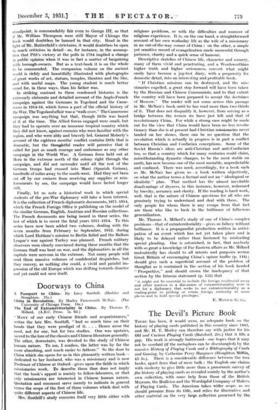Doorways to China
The End of Extraterritoriality in China. By Thomas F. Millard. (A.B.C. Press. 7s. 6d.) MANY of our early Chinese friends and acquaintances," writes the late Mrs. Soothill, " had so much time on their hands that they were prodigal of it. . . . Hence arose the need, not for one, but for two studies. - One was upstairs, sacred to the lore of the classics and Chinese literature generally. The other, downstairs, was devoted to the study of Chinese human nature. To me, I confess, the latter was by far the more absorbing, and much easier to fathom." So the door to China which she opens for us in this pleasantly written book— dedicated .to her husband, who was a missionary and is now Professor of Chinese at Oxford—gives upon the fields in which missionaries work. To describe them thus does not imply that the book's appeal is mainly to fellow-labourers, or that only missionaries are interested in Chinese human nature. Quotation and comment serve merely to indicate in general terms the scope of the first of three volumes which deal with quite different aspects of Chinese life. 11irs.'Soothill's study concerns itself very little either with religious problems, or with the difficulties and nuances of religious experience. It. is, on the one hand, a straightforward account of her own workaday life as the wife of a missionary in an out-of-the-way corner of China ; on the other, a simple yet sensitive record of evangelization made successful through patience; charity and a quick sense of humour.
Descriptive sketches of Chinese life, character and scenery, many of them vivid and penetrating, and a Wordsworthian higher truth and higher seriousness, convert what might
easily have- become a jog-trot diary, with a propensity for domeStic detail, into an interesting and profitable book.
" If Christian missions can be destroyed, and the mis- sionaries expelled, a great step forward will have been taken by the Russian and Chinese Communists, and to that extent the country will have been prepared to accept the doctrines of Moscow." . The reader will not come across this passage in Mr.- McNair's book until he has read more than two-thirds of it. That does not disqualify it, however, from serving as a bridge between the terrain we have just left and that of revolutionary China. For while a strong case might be made out for the view that China would have been no less revolu- tionary than she is at present had Christian missionaries never landed on her shores, there can be no question that the revolution which is actually in progress is in part a conflict between Christian and Confucian conceptions.- Some of the Soviet Russia's ideas arc anti-Christian and anti-Confucian too, so that a country which for many centuries could claim, notwithstanding dynastic changes, to be the most stable on earth, has now become one of the most unstable, unpredictable and confused. There was need, accordingly, for a book such as Mr. McNair has given us—a book written objectively, on what the author terms a factual and not an " ideological or idealistic " plan. That method has the almost inevitable disadvantage of dryness, in this instance, however, redeemed by brevity, accuracy and clarity. If the reading is hard work, well, that is the nature of Chinese questions for all who are genuinely trying to understand and deal with them. The only people for whom there is any escape from that fact are those who like to bask in the brilliance of fallacious generalization.
Mr. Thomas A. Millard's study of one of China's complex problems—that of extraterritoriality—gives us fallacy without brilliance. It is a propagandist production written in antici- pation of an event which has not yet taken place awl is likely to be delayed rather than hastened by misleading special pleading. One is astonished, in fact, that anybody with so great a knowledge of Far Eastern affairs as Mr. Millard undoubtedly has should to all intents and purposes accuse Great Britain of encouraging China's opium traffic (p. 144) ; should give such a superficial account of the problem of Shanghai as is contained in the section of his book headed Prospective," and should crown the inadequacy of that section by the fatuous statement (p. 152) that
" it might not be essential to include the foreign residential areas and other matters in a discussion 'of extraterritoriality were it not for 'a diplomacy that seeks to use extraterritoriality as a trading-point to prolong or retain foreign authority at some places and to hold special privileges."
E. MANICO GULL.










































 Previous page
Previous page